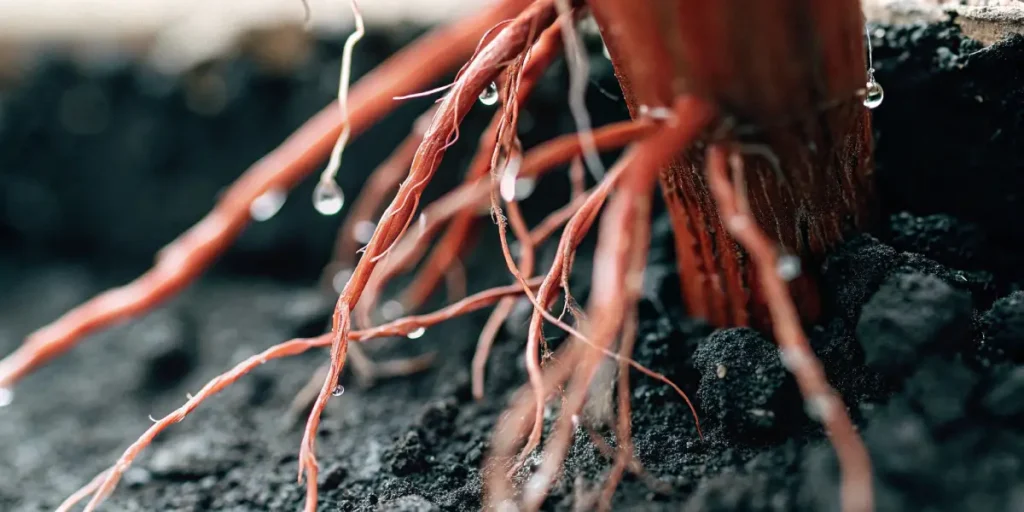
Types of Root Exudates in Cannabis
When you think about cannabis cultivation, you might picture the plant’s lush, green leaves or its aromatic buds. But there’s a lot happening underground that’s just as important. The types of root exudates in cannabis play a crucial role in how plants absorb nutrients and interact with their environment. Root exudates are organic compounds released by cannabis roots into the soil. These compounds can include sugars, amino acids, and organic acids, among others.
Cannabis root exudates and soil health are closely linked. These exudates act like messengers, communicating with the soil and its inhabitants. For instance, they can attract beneficial microbes, which help with nutrient uptake. This means that the health of your cannabis plants is directly tied to what’s happening below the surface.
Recommended Strains
Acapulco Gold Autoflower
|
|
THC | 20% - 24% (Medium) |
|
|
Type | Autoflowering |
|
|
Yield | Medium |
|
|
Phenotype | 30% Indica / 70% Sativa |
Acapulco Gold
|
|
THC | 15% - 19% (Medium) |
|
|
Type | Feminized |
|
|
Yield | Medium |
|
|
Phenotype | 30% Indica / 70% Sativa |
Different cannabis strains can produce varying types of root exudates. For instance, the GG4 strain from Blimburn Seeds may release a different mix of exudates compared to another strain like Critical Daddy Purple. Each strain’s unique profile influences its interactions with the soil, its growth rate, and ultimately, its yield.
Sugars and Their Impact
Sugars are one of the primary types of root exudates in cannabis. These sweet compounds serve as a food source for microbes living in the soil. When sugars are released, they attract beneficial bacteria and fungi. This boosts the soil’s microbial population, which in turn enhances nutrient availability for the plant.
Think of sugars as a way for the cannabis plant to recruit helpers. The microbes feed on the sugars and, in exchange, break down organic matter into forms the plant can absorb. This symbiotic relationship is a perfect example of biochemical interactions with cannabis exudates. The more diverse the microbial life, the healthier your cannabis plants will be.
Moreover, the continuous release of sugars can stabilize the soil environment, promoting a balanced nutritional profile. This is particularly important in preventing nutrient leaching, where essential minerals are washed away. By maintaining a stable environment, sugars help ensure that nutrients are retained within the root zone, ready for absorption.
Furthermore, sugars can influence the types of microbial communities that thrive around the roots. Certain microbes may become more dominant, enhancing specific nutrient cycles like phosphorus solubilization. This targeted nutrient release through cannabis root exudates can boost plant growth, leading to more robust yields.
Promos & Deals
Amino Acids and Their Functions
Amino acids are another key component of cannabis root exudates. These building blocks of proteins serve multiple functions. They can help the plant cope with stress, such as drought or nutrient deficiencies. When released into the soil, amino acids can act as signals to other organisms.
For example, amino acids can attract nitrogen-fixing bacteria. These bacteria convert atmospheric nitrogen into a form the plant can use, thus enhancing nutrient release through cannabis root exudates. Strains like Sour Diesel from Blimburn Seeds are known for their robust growth, partly due to their efficient use of amino acids in the soil.
Besides to stress responses, amino acids can also enhance the plant’s overall metabolic processes. By providing essential building blocks, they support protein synthesis, which is crucial for growth and development. This leads to healthier plants that are more resilient to environmental challenges.
Amino acids also play a role in the detoxification processes within the soil. By binding with harmful substances, they can reduce toxicity levels, making the soil a safer environment for plant roots and beneficial microbes. This underscores the importance of these compounds in maintaining soil health and promoting sustainable growth.

Organic Acids and Soil pH
Organic acids, such as citric and malic acid, are also types of root exudates in cannabis. These acids can alter the soil’s pH, making it easier for the plant to absorb nutrients. A slightly acidic environment often favors nutrient uptake, allowing your cannabis plants to thrive.
When cannabis releases organic acids, it can help dissolve mineral nutrients, making them available for uptake. This process is essential for the plant’s growth and development. A well-balanced pH can mean the difference between a mediocre yield and a bumper crop.
Furthermore, the consistent release of organic acids can prevent the accumulation of harmful salts in the soil. These acids can neutralize excessive alkalinity, promoting a more balanced soil chemistry conducive to plant growth. This highlights the subtle yet powerful impact of cannabis exudates on soil health.
Additionally, organic acids can chelate metal ions, preventing their toxic buildup while simultaneously making them more available for plant uptake. This dual function ensures that cannabis plants have access to essential micronutrients without the risk of toxicity, fostering an ideal growing environment.
Impact of Cannabis Exudates on Microbes
Microbes play a vital role in the soil ecosystem. They help decompose organic matter, fix nitrogen, and cycle nutrients. The impact of cannabis exudates on microbes is profound. These exudates can encourage the growth of beneficial microbes while suppressing harmful ones.
For instance, microbial populations can be influenced by the specific types of root exudates in cannabis. Some strains may foster a community of nitrogen-fixing bacteria, while others may support mycorrhizal fungi. This microbial diversity can improve soil structure, water retention, and disease resistance.
Moreover, the biochemical interactions with cannabis exudates can lead to the formation of biofilms around the roots. These biofilms can protect roots from pathogens and efficiently channel nutrients to the plant. This protective layer enhances plant health by minimizing disease incidence.
In the long term, a robust microbial community can lead to greater soil resilience. As these microbes decompose organic matter, they contribute to the formation of humus, enriching the soil. This continuous cycle supports sustainable cultivation practices, ensuring that soil health is maintained for future growth cycles.
Nutrient Release Through Cannabis Root Exudates
Nutrient release through cannabis root exudates is a complex process. When root exudates are released, they can bind to soil particles, releasing locked-up nutrients. This makes essential elements like phosphorus and potassium more readily available to the plant.
This nutrient release can be particularly beneficial in organic growing systems. By enhancing nutrient availability, cannabis plants can grow more robustly without the need for chemical fertilizers. This not only benefits the plant but also contributes to a more sustainable growing practice.
Additionally, exudates can influence the soil’s nutrient cycling, ensuring that minerals are continuously replenished. This dynamic process supports the plant’s ongoing needs, especially during critical growth phases. By maintaining nutrient availability, root exudates play a pivotal role in optimal plant development.
Through targeted nutrient solubilization, cannabis exudates can also prevent nutrient lockout, a common issue in intensive cultivation systems. By ensuring that nutrients remain available and not bound to soil particles, exudates help maximize nutrient uptake efficiency, resulting in more vigorous plant growth.

FAQs
What are the primary types of root exudates in cannabis?
Cannabis roots release various organic compounds into the soil, known as root exudates. The primary types include sugars, amino acids, and organic acids. These compounds play different roles in the soil ecosystem, influencing nutrient availability and microbial activity.
Sugars serve as food for beneficial microbes, amino acids act as signals and stress mitigators, and organic acids help in nutrient solubilization. Together, these exudates create a supportive environment for cannabis growth.
Knowing the types of root exudates in cannabis can help growers optimize their cultivation practices. By fostering beneficial microbial communities, these exudates can enhance soil health and promote sustainable farming methods.
For growers, recognizing the function of these exudates in nutrient cycling and soil health is crucial. By managing root exudate profiles, they can improve plant resilience, yield, and overall health, ensuring successful cultivation outcomes.
How do cannabis root exudates impact soil health?
Cannabis root exudates and soil health are intimately connected. Exudates can improve soil structure, enhance nutrient cycling, and boost microbial populations. This leads to a more fertile and resilient growth medium for cannabis plants.
Healthy soils result in healthier plants, which are more resistant to diseases and pests. Therefore, managing root exudates is a vital aspect of sustainable cannabis cultivation.
The impact of cannabis exudates on microbes is a testament to their importance. By promoting beneficial microbial activity, these exudates help maintain a balanced ecosystem, crucial for long-term soil fertility and plant health.
Furthermore, the function of root exudates in soil carbon sequestration is gaining attention. By contributing to the organic matter pool, exudates help capture atmospheric carbon, supporting environmental sustainability alongside productive cultivation.
Can different cannabis strains produce different root exudates?
Yes, different cannabis strains can produce varying types of root exudates. For instance, strains like GG, Sour Diesel, and Northern Lights each have unique exudate profiles that affect their growth and interaction with the soil.
The specific mix of sugars, amino acids, and organic acids released can influence microbial communities, nutrient uptake, and overall plant health, making strain selection an important consideration for growers.
By selecting strains with favorable exudate profiles, growers can enhance nutrient release through cannabis root exudates. This targeted approach can lead to higher yields and healthier plants, maximizing cultivation success.
Knowing strain-specific exudate profiles can also inform breeding programs. By developing strains with optimized exudate compositions, breeders can create plants that thrive in diverse growing conditions, expanding cultivation possibilities.
What is the function of microbes in relation to cannabis root exudates?
Microbes play a crucial role in the soil ecosystem, interacting closely with cannabis root exudates. They help decompose organic matter, fix nitrogen, and make nutrients available to plants. Exudates serve as a food source and signal for these microbes.
A healthy microbial community can enhance plant growth and resilience. By fostering beneficial microbes, cannabis plants can better absorb nutrients and resist environmental stresses.
The symbiotic relationship between microbes and exudates underpins many soil processes. This interaction not only supports plant health but also enhances soil structure, improving aeration and water retention capabilities.
By knowing the complex biochemical interactions with cannabis exudates, growers can cultivate a thriving soil microbiome. This enriched environment supports plant growth and contributes to a sustainable agricultural system.
How do organic acids in cannabis root exudates affect soil pH?
Organic acids released by cannabis roots can alter the soil pH, creating a more favorable environment for nutrient uptake. A slightly acidic pH can increase the solubility of minerals, making them more accessible to the plant.
Adjusting soil pH through organic acids is a natural way to improve nutrient availability without the need for chemical inputs. This helps in maintaining a balanced and healthy growing medium.
The ability of organic acids to modulate soil pH is a key factor in the success of organic growing systems. By naturally adjusting pH levels, these acids support a nutrient-rich environment conducive to cannabis growth.
This pH modulation by cannabis exudates can also prevent nutrient lockout, ensuring that essential minerals remain available to the plant. By maintaining optimal pH levels, growers can enhance plant health and productivity without reliance on synthetic inputs.




















